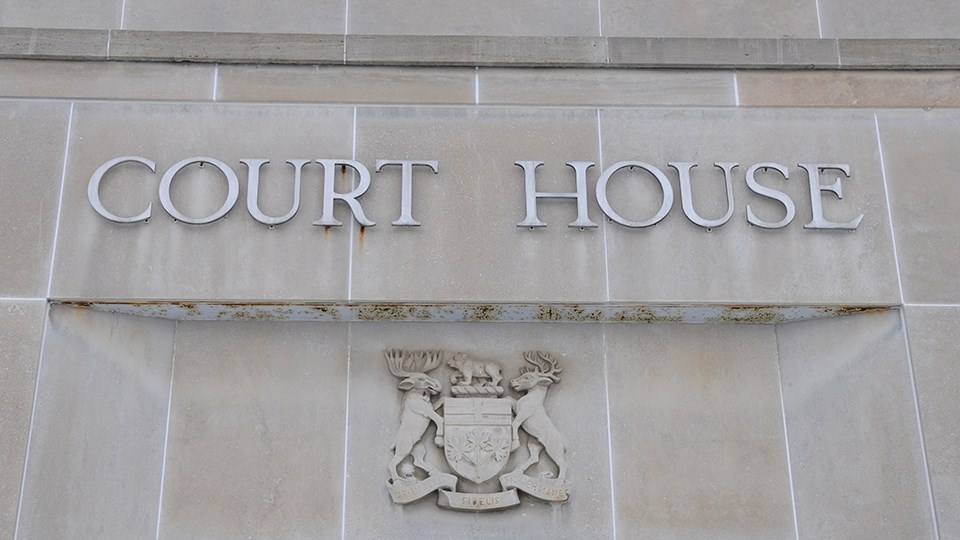A man accused of human trafficking appeared in a Sudbury courtroom last week, the first day of a trial continuation that saw the defence cross examine an alleged victim.
Paul Castonguay is facing charges including trafficking in persons under 18, material benefit from sexual services and several counts of assault.
There is a publication ban on testimony from the alleged victims, as well as their identities.
Castonguay was originally to appear for this trial continuation on Dec. 15, and though he arrived in court, his lawyer, Dennis Michel, told the judge that he’d not spoken to Castonguay in three weeks, despite repeated attempts to contact his client.
Though Justice Pierre Bradley was hesitant, he granted an adjournment.
Sudbury.com has since learned that Castonguay was taken into custody on Dec. 15. According to a Greater Sudbury police spokesperson, Castonguay was arrested on what’s known as a “surety warrant.”
A surety is a person who pledges to supervise an accused person while they are out on bail. A surety warrant is an arrest warrant issued when a surety cancels bail, which they may do at any time.
On Dec. 29, the Crown continued their prosecution of Castonguay.
In addition to the testimony of Castonguay’s alleged victim, two videos of his drug use and one video showing him exposing himself to the public were offered as evidence.
Late in the day, the Crown called Det-Cst. Stephen Bradley to the stand.
Bradley detailed the visits he made to Castonguay’s residence, the first of which occurred on March 26, 2021. Castonguay was arrested in May 2021.
“I was in the detective office, when I received a call from the uniformed staff sergeant informing me that there was a female at the hospital who had made some disclosures that were of some concern,” said Bradley. “I conducted several days later, where I received information of a concerning nature.”
He said that early interviews with the alleged victim, while they were still involved with Castonguay, did not yield much information.
However, when he considered the “constellation of information he received,” he felt it necessary to continue to interview the alleged victim.
Upon cross-examination, defence attorney Michel accused the officer of “planting the seed” of trafficking in the alleged victim's head and that Bradley was making his investigative choices based on a “morality issue, not a police issue.” Michel said the police prosecution of this case was based on a police narrative, rather than a crime.
“It's obvious from the statements that the focus was pushed by you,” and the victim's family, said Michel.
“I disagree with that,” said Bradley.
The detective suggested that the reason the alleged victim‘s interview elicited more information as time went on was a reflection of Castonguay’s loosening hold, and that the alleged victim did not make accusations until she was “not a victim and not being held against her will.”
Michel questioned Bradley about follow-up investigations regarding other potential victims of Castonguay, 10 of whom were mentioned in the testimony of the accuser.
Bradley said that as most went by a nickname or working name, including the accuser, they were unable to track these potential victims.
Defence then questioned Bradley on minute details of the interactions police had with Castonguay and the alleged victim, asking why, if the accuser is correct, did the officer not see any of the signs of physical abuse or drug use. Michel asked what Bradley did or didn’t see during police checks at Castonguay’s residence, especially anything that could be arrest-worthy, or back up the alleged victim’s testimony.
“You didn’t see the injuries, or drugs on the table, or anything?”
Bradley said he did not, and offered the lack of physical examination or previous search warrant for the residence as potential reasons.
Michel then tested the officer on the locations of interest in the case, questioning Bradley on specific details of the area and whether or not there were impediments to his view of the actions.
At times, it appeared Michel was deliberately offering incorrect information, which Bradley challenged.
Michel then finished his cross-examination, and court ended for the day.
The next date for this trial continuation is Feb. 28, but Castonguay will also appear in court on Jan. 5 for a bail/show cause hearing related to the cancellation of the surety warrant.
Jenny Lamothe is a reporter with Sudbury.com
